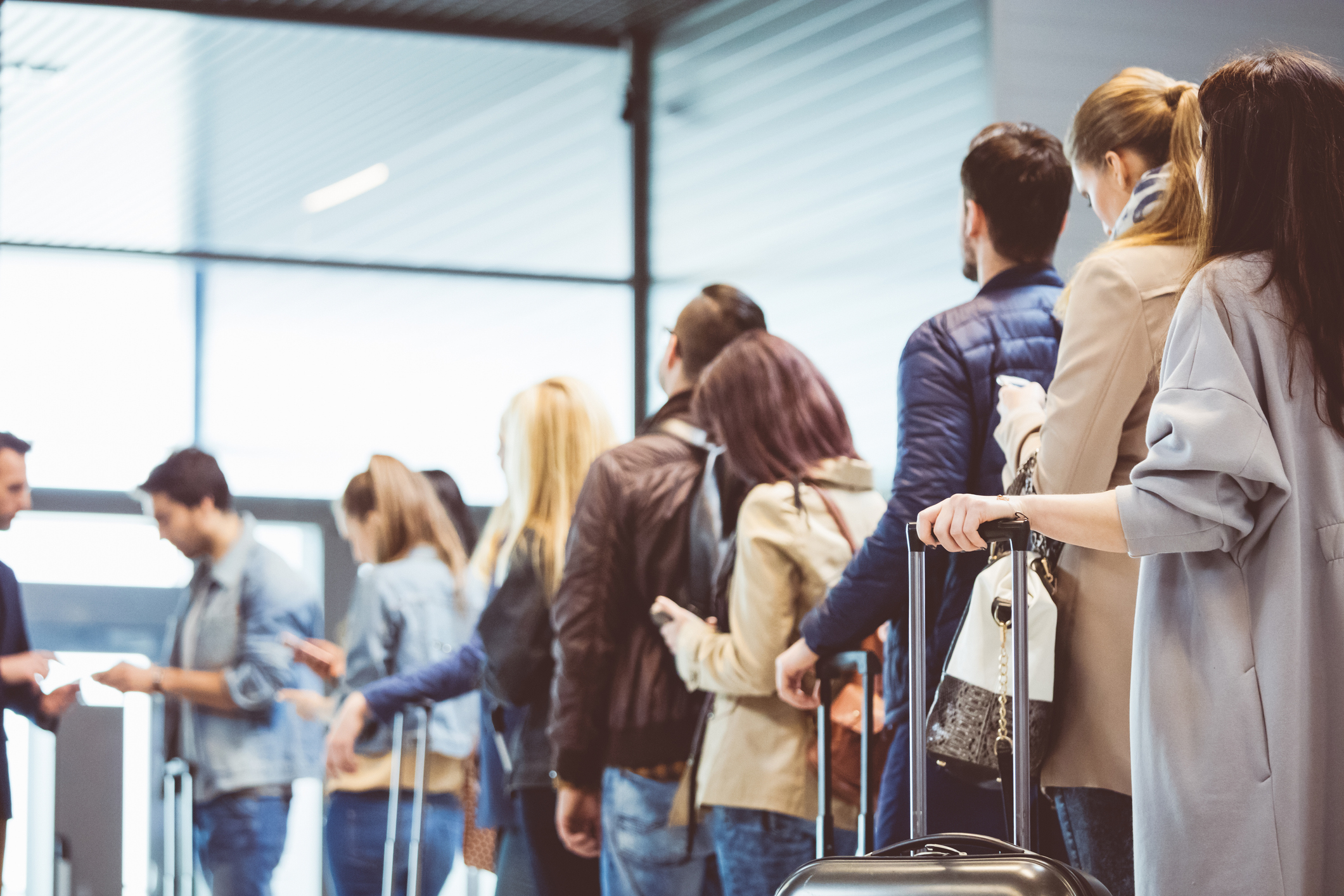Your American Airlines Flight Just Got More Expensive
The airline has raised checked bag fees for the first time since 2018.


Profit and prosper with the best of Kiplinger's advice on investing, taxes, retirement, personal finance and much more. Delivered daily. Enter your email in the box and click Sign Me Up.
You are now subscribed
Your newsletter sign-up was successful
Want to add more newsletters?

Delivered daily
Kiplinger Today
Profit and prosper with the best of Kiplinger's advice on investing, taxes, retirement, personal finance and much more delivered daily. Smart money moves start here.

Sent five days a week
Kiplinger A Step Ahead
Get practical help to make better financial decisions in your everyday life, from spending to savings on top deals.

Delivered daily
Kiplinger Closing Bell
Get today's biggest financial and investing headlines delivered to your inbox every day the U.S. stock market is open.

Sent twice a week
Kiplinger Adviser Intel
Financial pros across the country share best practices and fresh tactics to preserve and grow your wealth.

Delivered weekly
Kiplinger Tax Tips
Trim your federal and state tax bills with practical tax-planning and tax-cutting strategies.

Sent twice a week
Kiplinger Retirement Tips
Your twice-a-week guide to planning and enjoying a financially secure and richly rewarding retirement

Sent bimonthly.
Kiplinger Adviser Angle
Insights for advisers, wealth managers and other financial professionals.

Sent twice a week
Kiplinger Investing Weekly
Your twice-a-week roundup of promising stocks, funds, companies and industries you should consider, ones you should avoid, and why.

Sent weekly for six weeks
Kiplinger Invest for Retirement
Your step-by-step six-part series on how to invest for retirement, from devising a successful strategy to exactly which investments to choose.
If exorbitant airline fees have you reconsidering your travel plans, we have some bad news: American Airlines just announced that it's raising prices on checked baggage.
The new price structure, which marks the airline's first change since 2018, goes as follows:
- $35 for first checked bags purchased online for domestic flights, including to Alaska, Hawaii and Puerto Rico (up from $30)
- $40 for first checked bags on the same flights purchased at the airport (up from $35)
- $45 for second checked bags on domestic flights
- $35 for first checked bags to Canada and short-haul international flights
- $45 for second checked bags purchased online or at the airport to Canada and short-haul international flights
In a February 20 all Street Journal report, Scott Chandler, the airline's senior vice president of revenue management and loyalty, explained the reasoning behind the spike.
From just $107.88 $24.99 for Kiplinger Personal Finance
Become a smarter, better informed investor. Subscribe from just $107.88 $24.99, plus get up to 4 Special Issues

Sign up for Kiplinger’s Free Newsletters
Profit and prosper with the best of expert advice on investing, taxes, retirement, personal finance and more - straight to your e-mail.
Profit and prosper with the best of expert advice - straight to your e-mail.
“Fuel is a big component—obviously the more bags we carry, the more fuel you’re burning,” he said. “The cost of handling bags across the board, from real estate, machinery, et cetera, has gone up. This is trying to match that.”
American Airlines did not immediately return a request for comment.
It's not all bad news, though. American is simultaneously lowering the amount it charges for overweight luggage, kind of. Now, instead of $100 to $200, customers with bags that weigh between 50-53 lbs will be required to pay $30, while those with bags between 53-70 lbs will continue to pay the higher fee.
Troubles in the sky
Despite the fact that overall, the cost of domestic travel went down in 2023, there have been many instances of overpaying, either in fees or time spent — including on American.
As Kiplinger previously reported, the airline was fined more than $4 million after the Department of Transportation (DOT) found it illegally made 5,821 passengers wait on tarmacs for hours at a time without letting them deplane. Spirit was required to pay more than $8 million over carry-on fees.
On the flip side, many airlines have done away with flight change fees, a holdover from the drop in revenue during the early days of the COVID-19 pandemic.
As airlines continue to slap on additional flight fees, there are some steps you can take to avoid costly airline fees and make travel a bit more affordable. These include booking your flight as far in advance as possible to take advantage of free seat selection, booking your flight online rather than over the phone, which can incur a fee, or to pick airlines that don't charge for checked baggage.
And if you happen to be looking for some of the best places to visit where the dollar is strong, check out our list of the top-10 from the Americas and Europe to Africa and Asia.
RELATED CONTENT
Profit and prosper with the best of Kiplinger's advice on investing, taxes, retirement, personal finance and much more. Delivered daily. Enter your email in the box and click Sign Me Up.

Jamie Feldman is a journalist, essayist and content creator. After building a byline as a lifestyle editor for HuffPost, her articles and editorials have since appeared in Cosmopolitan, Betches, Nylon, Bustle, Parade, and Well+Good. Her journey out of credit card debt, which she chronicles on TikTok, has amassed a loyal social media following. Her story has been featured in Fortune, Business Insider and on The Today Show, NBC Nightly News, CBS News, and NPR. She is currently producing a podcast on the same topic and living in Brooklyn, New York.
-
 5 Vince Lombardi Quotes Retirees Should Live By
5 Vince Lombardi Quotes Retirees Should Live ByThe iconic football coach's philosophy can help retirees win at the game of life.
-
 The $200,000 Olympic 'Pension' is a Retirement Game-Changer for Team USA
The $200,000 Olympic 'Pension' is a Retirement Game-Changer for Team USAThe donation by financier Ross Stevens is meant to be a "retirement program" for Team USA Olympic and Paralympic athletes.
-
 10 Cheapest Places to Live in Colorado
10 Cheapest Places to Live in ColoradoProperty Tax Looking for a cozy cabin near the slopes? These Colorado counties combine reasonable house prices with the state's lowest property tax bills.
-
 My First $1 Million: Retired Nuclear Power Plant Supervisor, 68, Wisconsin
My First $1 Million: Retired Nuclear Power Plant Supervisor, 68, WisconsinEver wonder how someone who's made a million dollars or more did it? Kiplinger's My First $1 Million series uncovers the answers.
-
 No-Fault Car Insurance States and What Drivers Need to Know
No-Fault Car Insurance States and What Drivers Need to KnowA breakdown of the confusing rules around no-fault car insurance in every state where it exists.
-
 7 Frugal Habits to Keep Even When You're Rich
7 Frugal Habits to Keep Even When You're RichSome frugal habits are worth it, no matter what tax bracket you're in.
-
 How Much It Costs to Host a Super Bowl Party in 2026
How Much It Costs to Host a Super Bowl Party in 2026Hosting a Super Bowl party in 2026 could cost you. Here's a breakdown of food, drink and entertainment costs — plus ways to save.
-
 3 Reasons to Use a 5-Year CD As You Approach Retirement
3 Reasons to Use a 5-Year CD As You Approach RetirementA five-year CD can help you reach other milestones as you approach retirement.
-
 How to Watch the 2026 Winter Olympics Without Overpaying
How to Watch the 2026 Winter Olympics Without OverpayingHere’s how to stream the 2026 Winter Olympics live, including low-cost viewing options, Peacock access and ways to catch your favorite athletes and events from anywhere.
-
 Here’s How to Stream the Super Bowl for Less
Here’s How to Stream the Super Bowl for LessWe'll show you the least expensive ways to stream football's biggest event.
-
 The Cost of Leaving Your Money in a Low-Rate Account
The Cost of Leaving Your Money in a Low-Rate AccountWhy parking your cash in low-yield accounts could be costing you, and smarter alternatives that preserve liquidity while boosting returns.